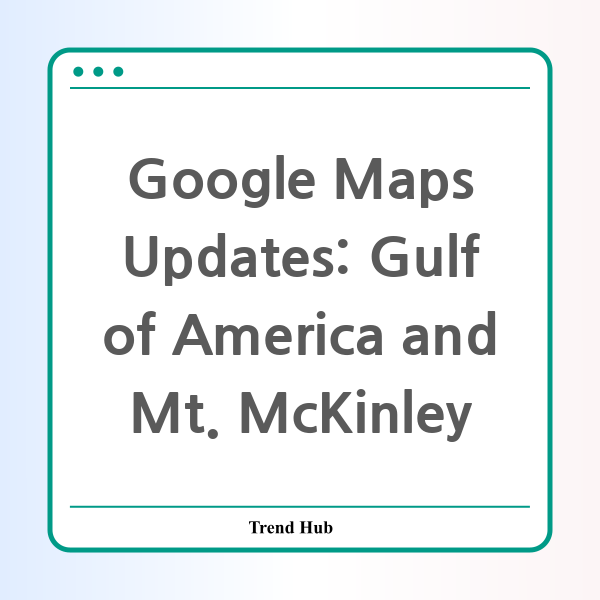* This website participates in the Amazon Affiliate Program and earns from qualifying purchases.

Have you ever wondered how geographic names impact our understanding of places? With recent announcements from Google, the names we associate with significant locations are changing, and it’s stirring up conversations across the nation. In a controversial move, Google has committed to updating the name of the Gulf of Mexico to the "Gulf of America" on its Maps platform, aligning with governmental directives.
Following President Trump’s executive order, Google will reflect these changes in its Maps application. This decision isn’t just about a name change; it represents a broader dialogue about identity, heritage, and the sense of belonging in a diverse nation.
What Led to This Change?
In an effort to align official geographic names with governmental standards, the Trump administration ordered the name changes for specific geographical entities. This includes reverting the name of Denali back to Mount McKinley, a name historically tied to former President William McKinley. By making these changes official, the government aims to reaffirm certain narratives surrounding American history and identity.
The Gulf of Mexico, now to be called "Gulf of America," will see a similar fate. Google, which has a practice of reflecting the latest updates from official sources, responded quickly to these changes. In a recent communication, the tech giant stated, "We have a longstanding practice of applying name changes when they have been updated in official government sources." This means U.S. users will now see the updated name while users in Mexico will continue to see the Gulf of Mexico. Furthermore, international users will have the benefit of seeing both names displayed on their maps. This dual-naming strategy underscores Google’s commitment to inclusivity, ensuring that diverse geographical identities are acknowledged.
The Impact of Name Changes on Cultural Identity
The naming of geographical locations is more than a mere label; it reflects a deep-seated cultural and historical significance. The Gulf of Mexico has been recognized for its unique cultural tapestry, rich biodiversity, and crucial economic role. Changing its name to the Gulf of America can be perceived as an attempt to centralize American identity, potentially minimizing the historical and cultural contexts of neighboring countries.
Similarly, Mount McKinley, originally named to honor a president, was renamed Denali to pay homage to the indigenous peoples of Alaska, who have long revered the mountain. This tug-of-war between names demonstrates the broader discourse surrounding cultural recognition and historical accuracy in the context of American geography.
What This Means for Google Maps Users
So, what should Google Maps users expect moving forward? U.S. users will see the new name, while those from Mexico will continue seeing the traditional name reflecting their geographic identity. For users globally, the dual naming offers an insightful glance into the complexities of geopolitical relationships and the layers of history that shape our world today.
This change may also influence how users interact with their surroundings. Whether it sparks discussions about geography, history, or identity, it’s crucial to recognize the implications behind seemingly simple name changes. As Google continues to roll out these updates, users will need to adapt to navigating the newfound names while being mindful of the cultural significance they carry.
As this story develops, it’s essential to remain informed about how such updates may shape geographic understanding. The conversation surrounding names is reflective of a more extensive cultural landscape, one that continues to evolve through technology and changing societal values.
Stay tuned for more updates on this developing story and how it affects your usage of digital mapping tools and understanding of geographical identities!
* This website participates in the Amazon Affiliate Program and earns from qualifying purchases.